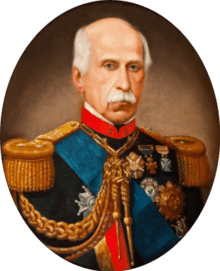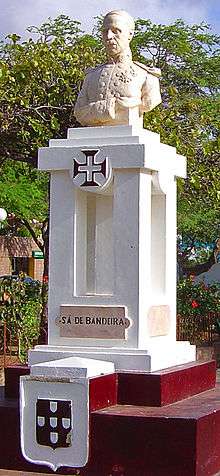Bernardo de Sá Nogueira de Figueiredo, 1st Marquis of Sá da Bandeira
| Bernardo de Sá Nogueira de Figueiredo | |
|---|---|
| Marquis Sá da Bandeira | |
 | |
| Marquis Sá da Bandeira | |
|
Full name
Bernardo de Sá Nogueira de Figueiredo | |
| Born |
26 September 1795 Santarém, Kingdom of Portugal |
| Died |
6 January 1876 (aged 80) Lisbon, Kingdom of Portugal |
| Noble family | de Sá |
|
Issue
Luísa Aglaé Fanny de Sá Nogueira | |
Bernardo de Sá Nogueira de Figueiredo, 1st Marquess de Sá da Bandeira (Santarém; 26 September 1795 – Lisbon; 6 January 1876) was a Portuguese nobleman and politician. He served as Prime Minister of Portugal for five times. He was the most prominent Portuguese defender of the abolition of slavery in Portugal and its domains.
Life

Sá Nogueira de Figueiredo was born in Santarém in 1795 to Faustino José Lopes Nogueira de Figueiredo e Silva (1767-1830) and Francisca Xavier de Sá Mendonça Cabral da Cunha Godolphin (1772-1829).
Sá Nogueira de Figueiredo supported the liberal party during the Liberal Wars (1828-1834). He was Prime Minister in exile from 1832 to 1833. He fought in the Siege of Porto and was wounded in his right arm, which had to be amputated. On 4 April 1833, he became Baron of Sá da Bandeira, a year later on 1 December, he became Viscount of Sá da Bandeira.
Bernardo took part in the Portuguese September Revolution in 1836 and two months later was Prime Minister of Portugal from 5 November 1836 to 2 June 1837 and again two months later from 10 August 1837 until 18 April 1839.
He named Mindelo what was the only settlement on the island of São Vicente, Cape Verde, which was renamed from Nossa Senhora da Luz. The settlement (now city) of Mindelo was named after the Battle of Mindelo, a landing made by Peter IV, as part of Portugal's Wars of Liberation, on the shores of Mindelo, Portugal southwest of Porto. A bust of him was erected in Mindelo, Cape Verde after the city adopted the name. It is one of several Portuguese made statues that still exists in the city after Cape Verde's independence in 1975.
He was an interim Prime Minister from 12 September to 6 October 1862. On 3 February 1864, he became the first Marquis of Sá da Bandeira. He was not again Prime Minister until 17 April 1865 where he succeeded the Marquis of Loulé, he held it just for a few months until 4 September and was succeeded by Joaquim António de Aguiar. He got the post for the fourth time on 22 July 1868 after succeeding the Count of Ávila and remained until 11 August 1869 and was succeeded by the person who he succeeded in 1865 but this time as the Duke of Loulé. He became Prime Minister for the sixth time on 29 August 1870, he briefly held it for three months until 29 October and was succeeded by the same person who he succeeded but this time as the Marquis of Ávila.
He never married but he had a natural daughter by an unknown mother, named Luísa Aglaé Fanny de Sá Nogueira, who married as his first wife her uncle Faustino de Paiva de Sá Nogueira (8 February 1845 – 18 May 1920), without issue. He became their universal heir. The city of Lubango, Angola, was called Sá de Bandeira when the Angolan territory was under Portuguese rule.
He was also a freemason.